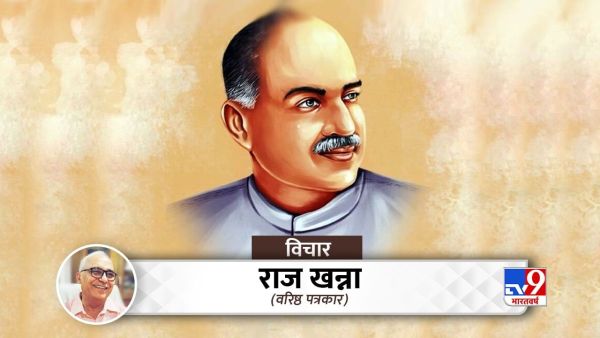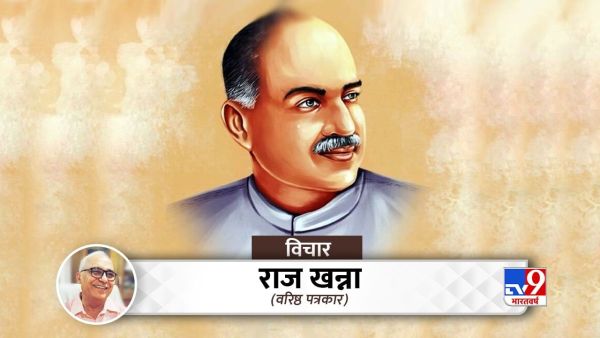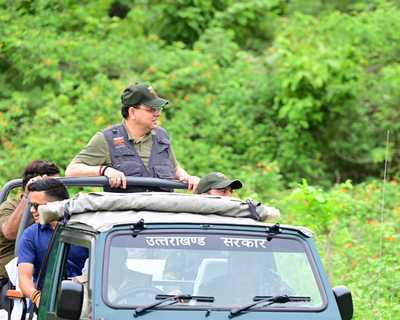

Shyama Prasad Mukherjee's birth anniversary being celebrated across the country today
During the ban after the Gandhi murder case, the Rashtriya Swayamsevak Sangh (RSS) had started to feel the need of a political party with equal ideology that could firmly keep the side of the Sangh and outside. On 15 April 1950, after the resignation of Shyama Prasad Mukherjee from Pandit Nehru cabinet, the Sangh and his well -wishers greeted him publicly. By that time, the distance from Mukherjee's Hindu Mahasabha had increased a lot.
He was trying to form a new party with the cooperation of the Sangh. Many Sangh officials were also excited about this. But the Sangh chief Golvarkar was in a dilemma about the association of the Sangh with a political party. The first general election was near. Mukherjee was not ready to wait. His supporters announced a new party called Republic Council in Odisha.
On the other hand, Mukherjee went back to Bengal and formed a new party called "Indian People's Party". At this point, the Sangh experienced that in the event of delay, he would have to be deprived of the leadership of Dr. Shyama Prasad Mukherjee. Then the Sangh agreed. The formation of the Bharatiya Jana Sangh was announced under the leadership of Mukherjee. His "Indian People's Party" merged with the Jana Sangh.
Sangh and Mukherjee: Need for each other
On 8 April 1950, the Nehru-Liaquat agreement in Delhi was described by Dr. Shyama Prasad Mukherjee as a deception of the Hindus of Bengal. He resigned on 15 April 1950 in protest against this from Nehru cabinet. Sardar Patel had died on 15 December 1950. After Patel's death, Congress President Purushottam Das Tandon resigned from the post under the pressure of Pandit Nehru. Initially excited by Tandon, the Sangh was disappointed with him. The Sangh now had expectations from Mukherjee.
Mukherjee also needed the cooperation of a strong organization for the new political party. Both were attracting each other. Mukherjee met Guru Golvarkar. Despite feeling the need of the allied political party, Guru Ji was worried that the attraction of political power should not be aimed at the objective of the Sangh.
Do not be an elephant, need to curb it
During the ban after the Gandhi assassination, the Sangh had a lack of MPs of its ideology, especially in Parliament. There was no one to favor him there. It was only after lifting the ban on 11 July 1949, a large section of the next line of the Sangh was active in favor of the formation of a favorable political party. Sangh chief Guruji was also not against it. But for ideological support, instead of limiting the union to one party, he was in favor of a group of Sangh supporters in every party.
According to Dattopant Thangdi, "Guruji used to feel that he will be narrowed by associating Hindu interests with a party. Their pressure capacity will be reduced. If the spokespersons of Hindu interests live in all parties, the pressure capacity will be more. The creation of a political party for power at the all -India level can disrespect us from Hindu interests. They wanted the role of a Hindu organization in politics."
First general election: Time short for new party
According to Balraj Madhok, one of the founders of Bharatiya Jana Sangh, the first general election was near. Within a short time, the new party had a lot of challenge to register its effective presence in the elections. Mukherjee realized this. They could not wait for more days. Many Sangh leaders were excited about the new party. But the consent of the Sangh chief Guruji was remaining.
Madhok wrote in his autobiography, "The manifesto of the party was ready but the Sangh leadership still could not make any definite opinion about the role of the proposed party. He kept asking Dr. Mukherjee for some time and waiting. But Dr. Mukherjee understood the importance of time in politics. He wanted to prepare the organizational structure of the proposed party before elections. His colleagues of Odisha did not make much wait and made the name of" Republic of ". Dala returned to Bengal, so he was worried and announced his political organization in the name of "Indian People's Party". "
Finally the union is ready
This was the place when the Sangh felt that if Mukherjee's leadership is needed, he would have to take a quick decision in relation to the party. According to Madhok, “In early 1951, the Sangh met the Sangh Sanghchalak Hansraj Gupta, Province Union, Basant Rao Ok and I met Dr. Mukherjee at their residence in Pusa Road and assured full cooperation in the formation of the All India Political Party under his leadership. A few days later it was decided in a meeting held under the chairmanship of Mukherjee in a meeting held under the chairmanship of Mukherjee. Units of Jana Sangh should be formed in some states. "
Current darkness- future bright
The establishment of Bharatiya Jana Sangh was Lala Hansraj Gupta (Delhi Province Union Director), Basantrao Oak (Delhi province preacher), Dharamvir (Punjab Province Karyavas), Balraj Madhok and Bhai Mahavir in the lead roles. In different states, those who were given this responsibility were, Deendayal Upadhyay and Nanaji Deshmukh in Uttar Pradesh, Manohar Rao Moghe in Madhya Pradesh, Sundar Singh Bhandari in Rajasthan, Thakur Prasad in Bihar etc.
The Bharatiya Jana Sangh was established under the chairmanship of Dr. Shyama Prasad Mukherjee at the National Conference held at Arya Kanya Higher Secondary School in Delhi on 21 October 1951. Bhai Mahavir was made General Secretary. On this occasion, Mukherjee had said, "We are committed to the Renaissance and reconstruction of India. Forget the distinctions of our class, caste and religion and get involved in the service of India. As much as the present is dark but the future is bright. The symbol of our party is lamp. It is spreading the light of hope, unity, commitment and courage."
-
Arsenal finally announce Martin Zubimendi transfer after frustrating delay

-
Uttarakhand CM Dhami Experiences Jungle Safari at Corbett National Park; Over 1000 Trees Planted Under 'One Tree for Mother' Campaign

-
Victor Osimhen has four-word transfer message to remember amid Arsenal and Chelsea summer wait

-
Meet the Adorable Dog Who Drives a Girl Home from School: A Viral Sensation!

-
Meet the Adorable Dog Who Drives a Girl Home from School: A Viral Sensation!
